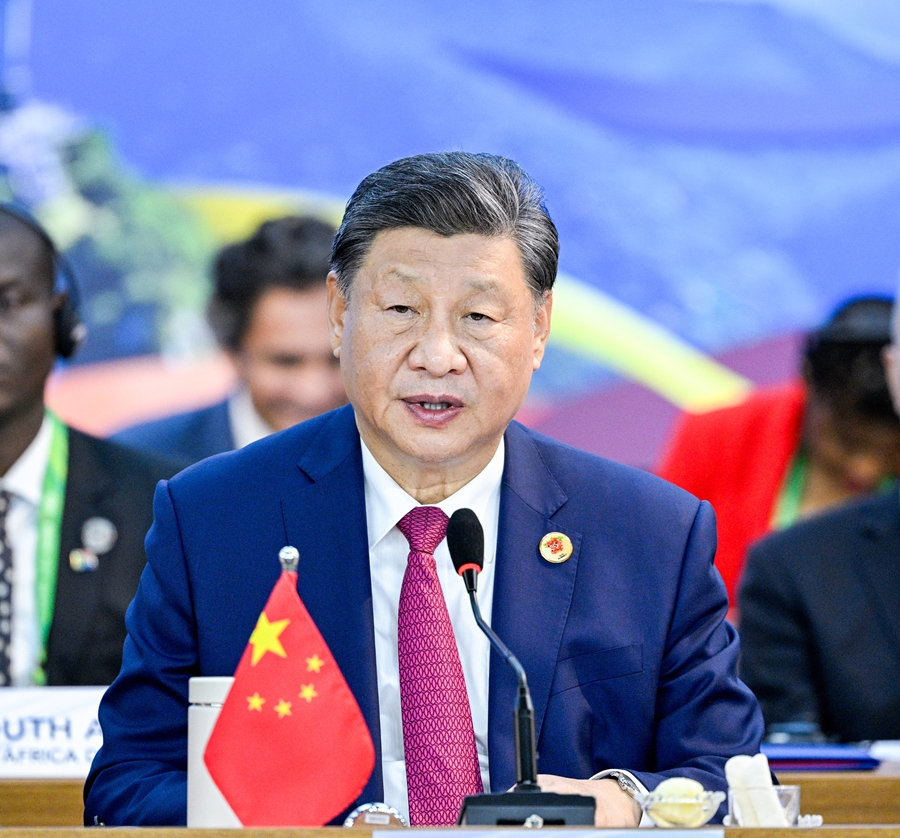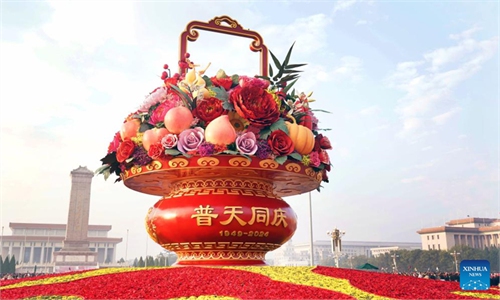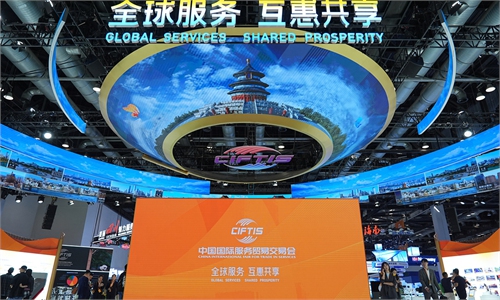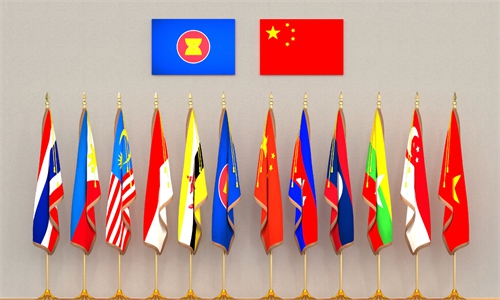Xi calls for a fair, equitable global governance system, warns against protectionism at G20 summit
China increasingly takes lead in promoting global multilateralism: UK scholar

Chinese President Xi Jinping delivers an important speech entitled "Working Together for a Fair and Equitable Global Governance System" at the Session II of the 19th G20 Summit on Reform of the Institutions of Global Governance in Rio de Janeiro, Brazil, Nov. 18, 2024. Xi attended the G20 Summit here on Monday. Photo: Xinhua
Chinese President Xi Jinping's remarks at the 19th G20 Summit in Rio de Janeiro, Brazil, where he called for building a fair and equitable global governance system and outlined China's eight actions for global development, drew widespread attention and positive response among participants.
Meanwhile, in line with Xi's remarks calling for practicing true multilateralism, G20 leaders reaffirmed their strong commitment to multilateralism and pledged to reform the global governance system, according to the G20 Rio de Janeiro Leaders' Declaration released on Tuesday.
Xi on Monday called for building a fair and equitable global governance system, while warning against politicizing economic issues, fragmenting the global market and taking protectionist moves, in remarks delivered at the Session II of the 19th G20 Summit in Rio de Janeiro, Brazil.
"We should keep in mind that mankind lives in a community with a shared future, see each other's development as opportunities rather than challenges, and view each other as partners rather than rivals," Xi said in the speech.
"In light of the G20's mandate, we could build greater international consensus in the economic, financial, trade, digital and eco-environmental fields, among others, to improve global governance and promote an equal and orderly multipolar world and a universally beneficial and inclusive economic globalization," Xi said.
In the remarks, Xi stressed the need to improve global economic governance and build a world economy characterized by cooperation, the need to improve global financial governance and build a world economy characterized by stability, and the need to improve global trade governance and build a world economy characterized by openness.
"We should press ahead with reforming the World Trade Organization (WTO), oppose unilateralism and protectionism, restore the normal functioning of the dispute settlement mechanism as soon as possible, include the Investment Facilitation for Development Agreement into the WTO legal framework, and reach early consensus on the e-commerce agreement," Xi said.
"It is important to avoid politicizing economic issues, avoid fragmenting the global market, and avoid taking protectionist moves in the name of green and low-carbon development," he said.
The Chinese president also emphasized the need to improve global digital governance and build a world economy characterized by innovation, saying that "we should step up international governance and cooperation on artificial intelligence (AI), to make sure that AI is for good and for all, not a game of the rich countries and the wealthy."
Xi also stressed the need to improve global ecological governance and build a world economy characterized by eco-friendliness. "China stands ready to continue to deepen international cooperation with all sides on green infrastructure, green energy, green mining and green transport, and will provide support to developing countries to the best of its ability," he said.
Leading multilateralism, supporting Global South
In Rio de Janeiro, the Chinese president's attendance and remarks at the G20 summit drew widespread attention, with journalists from around the world closely following Xi's meetings and commending his remarks for promoting multilateral cooperation on addressing global challenges.
"I think that Xi has set out a really significant international agenda, so he had outlined his eight concrete actions," Matthew Bishop, a senior lecturer in international politics at the University of Sheffield in the UK, told the Global Times on Monday on the sidelines of the G20 Summit in Rio de Janeiro. "It seems to me that China is increasingly trying to take a lead when it comes to global multilateralism."
Also in his remarks on Fight Against Hunger and Poverty at Session I of the 19th G20 Summit on Monday, Xi said that China is ready to work with all parties to build a just world of common development and outlined China's eight actions for global development, including pursuing high-quality Belt and Road cooperation, implementing the Global Development Initiative, and supporting development in Africa.
Xi stressed China's support for the Global South. China will always be a member of the Global South, a reliable long-term partner of fellow developing countries, and a doer and go-getter working for the cause of global development, he said at Session I of the 19th G20 Summit on Monday.
Among the eight actions outlined by Xi, three specifically mentioned the Global South. For example, China will make sure the Global South research center that is being built is fit for purpose, and the 20 billion US dollars of development funds will continue to be put to good use to support developing countries and deepen practical cooperation in areas such as poverty reduction, food security and the digital economy.
He said China, alongside Brazil, South Africa and the African Union, is proposing an Initiative on International Cooperation in Open Science to help the Global South gain better access to global advances in science, technology and innovation.
He also stressed supporting the G20 in carrying out practical cooperation for the benefit of the Global South and using such outcomes as the Roadmap to Increase Investment in Clean Energy in Developing Countries and the High-Level Principles on Bioeconomy to good effect.
Fighting hunger and poverty has become a priority issue at this year's G20 Summit in Rio de Janeiro, with the first session of the G20 Summit focusing on the issue and a Global Alliance Against Hunger and Poverty launched, with China having decided to join as a key participant.
China has made historical achievements in alleviating poverty and can make significant contributions to global poverty alleviation through partnerships with countries like Brazil, according to foreign experts.
Theo Schunck, executive secretary of the Rio Metropolis Institute, said that the most urgent global challenges today include environmental crises such as climate change, biodiversity loss, and pollution, social and economic inequalities, including hunger and poverty, geopolitical tensions and regional conflicts.
"China and Brazil can work together in various ways to address these challenges," Schunck told the Global Times.
China's increasingly critical role in addressing global challenges and promoting common development is also evident on the sidelines of the G20 Summit in Rio de Janeiro, where local residents, foreign visitors and summit staff showed significant interest in China, its economic progress, and cultural contributions.
At the G20 media center on Monday, a Portuguese student volunteer at the G20 Summit demonstrated his Chinese language skills to the Global Times.
"I am fascinated by China and I think China is such a big and important country. The West has a lot of misconceptions toward China, so I want to learn Chinese so I can better understand China," the volunteer named Rafael told the Global Times, when asked why he is interested in studying Chinese.
Xi's speech attracted attention from world media. Reuters and the VOA have highlighted a series of steps announced by the Chinese president to support the Global South, such as the "China would support global development with eight actions, including building 'high quality' Belt and Road Initiative", and the "Open Science International Cooperation Initiative" that aims at boost sci-tech innovation for the Global South has also attracted high attention.
G20 declaration
According to the G20 Rio de Janeiro Leaders' Declaration released on Tuesday,the leaders pledged to work for a reinvigorated and strengthened multilateral system, rooted in the purposes and principles of the UN Charter and international law, with renewed institutions and a reformed governance that is more representative and effective.
G20 leaders also called for urgent action to address major geopolitical, socioeconomic, and climate and environmental challenges and crises, according to the Declaration.
The leaders reaffirmed the role of the G20 which is well suited to address those challenges through much-needed international cooperation and political drive and also their strong commitment to the Sustainable Development Goals.
Bishop also noted that the G20 Summit has a good agenda on substantial global issues, including Global South unity and fighting poverty. "The thing that I'm really liking about this particular G20 is this kind of sense of Global South unity," the UK scholar said.




